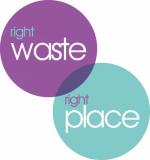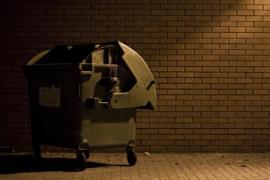Waste management - duty of care
Waste management - duty of care
Environmental Protection Act 1990 and The Waste (England and Wales) Regulations 2011
Contents
- Trade waste
- Your responsibilities
- Waste duty of care code of practice
- Householders’ duty of care
- Hazardous waste
- Enforcement
Trade waste
Trade waste is any waste that is produced by a business activity, including one run from your home. By law you are required to make suitable arrangements for this waste to be stored, transferred and disposed of correctly and safely.
There are a number of waste classifications in the UK.
'Commercial waste' is waste generated from premises used wholly or mainly for the purposes of a trade or business or the purposes of sport, recreation or entertainment. Commercial waste does not include household waste or industrial waste.
'Industrial waste' includes waste from a factory, from construction or demolition works, most scrap metal and from some activities involving chemicals.
'Household waste' is produced at a property used wholly for the purposes of living accommodation. However this classification also covers waste produced by schools, care homes, hospitals, hostels, hotels, short term holiday rentals, prisons and places of worship. As such waste is produced by a business or other undertaking, the producers have to pay for its collection and disposal (as is not from a residential dwelling) as trade waste.
Some wastes, because of their harmful or polluting properties and the difficulty in handling them, are classified additionally as 'hazardous waste'.
Does my business produce waste?
If you run a business you will almost certainly produce waste. Waste is any substance or object that your business discards, intends to discard or is required to discard. Once a substance or object is classed as waste, it will remain waste until it no longer poses a potential threat to the environment or human health. The term 'discard' applies to both recovery and disposal of waste and it does not mean the substance or object has no commercial value.
There are a range of options including recycling and recovery, which can put your waste materials back into good use. Material being recovered, e.g. sent for recycling or prepared for reuse, is still classed as waste until it is made into a useable product again or meets defined end of waste conditions.
If you are the producer or holder of a material and you’re unsure whether it’s a waste or not, please refer to the guidance which has been published to help you assess the status of your material:
Further guidance is available to help you classify your waste and find the relevant waste codes:
Alternatively, the Environment Agency has a National Customer Contact Centre who can be contacted on 03708 506 506 or via email enquiries@environment-agency.gov.uk
Your responsibilities
If it’s not managed properly, waste can pose a threat to the environment and human health. It is also a valuable resource which can often be reused or recycled.
We recommend that you refer to the Government's guidance on how to manage, recycle and dispose of trade waste.
Section 34(1) of the Environmental Protection Act 1990 imposes a duty of care on persons who produce controlled waste (with a limited exception for householders) and those who transport, import, keep, treat or dispose of waste.
Businesses have a legal responsibility to ensure that any waste they produce or hold does not harm the environment. You must, by law:
- keep waste to a minimum by doing everything you reasonably can to prevent, reuse, recycle or recover waste (in that order) – get help to do this.
- sort and store waste safely and securely. Keep it in a suitable container, to prevent leakage, contamination or access by others. If you put loose waste in a skip or on a lorry, cover it.
- complete a waste transfer note (also referred to as a 'written description' or 'written information') for each load of waste that leaves your premises and keep it for a minimum of two years. Each holder of the waste must describe it so as to enable the lawful and safe handling, transport, treatment, recovery or disposal by subsequent holders.
- if you give waste to someone else, check they have the authority to take it. The law says the person to whom you give your waste must be authorised to take it. Check if your waste carrier is registered to transport the waste. They must have an up to date and valid upper tier registration with the Environment Agency.
- not allow the waste carrier to dispose of your waste illegally (and report them to the Environment Agency, us or Crimestoppers if they do).
If you do not follow these rules, you may be committing a criminal offence. A breach of the duty carries an unlimited fine in the magistrates’ court or the Crown Court.
We encourage all businesses to reduce, reuse and recycle their waste. There is a legal duty to do this. Please see the guidance on applying the waste hierarchy.
It is illegal to mix a hazardous waste with either non-hazardous waste or another hazardous waste.
Disposing of your waste
Check whether a waste carrier or other waste operator is authorised on the Environment Agency’s online public register. If they do not appear, telephone the Agency on 03708 506 506.
If you regularly transport your own waste, you may need to be registered with the Environment Agency. See the guidance on registering as a waste carrier.
The Council provides a trade waste collection service.
Depending on what you’re doing with your waste, you may also need to apply for a waste permit.
Waste duty of care code of practice
The Government publishes a code of practice, providing practical guidance on how to meet your waste duty of care requirements. We recommend you read the code of practice when setting up a business and dealing with waste. This provides more information than we can summarise here.
Further practical advice on how to manage waste safely and efficiently is available on the Right Waste, Right Place website and in this guide:
 Right Waste, Right Place - a simple guide to duty of care
Right Waste, Right Place - a simple guide to duty of care
On the Right Waste, Right Place website you will find relevant videos, case studies, guidance, questions and answers as well as useful links.
The Right Waste, Right Place campaign is managed by the Environmental Services Association and sponsored by the Environment Agency, Natural Resources Wales and Chartered Institution of Wastes Management. It is supported by the Federation of Small Businesses, Build UK, National Farmers Union, Veolia, Travis Perkins, URoC, SUEZ and the Local Authority Recycling Advisory Committee.
Hazardous waste
Certain wastes are classified as 'hazardous waste'. Waste is considered hazardous when it contains substances or has properties that might make it harmful to human health and/or to the environment. The Environment Agency's interpretation of the definition and classification of hazardous waste can be found in their technical guidance WM2.
Some wastes are always hazardous, such as lead acid batteries, motor oil and fluorescent tubes, and others may be hazardous and need to be assessed, such as paint and solvents.
If you have hazardous waste, specialist advice should be sort and extra measures taken to ensure you comply with the law. Do not dispose of hazardous waste with general wastes.
Enforcement
Your duties start from the moment you produce waste and may continue beyond the appropriately authorised waste contractor you engage to deal with it. You need to satisfy yourself that not only have you managed the waste you produce correctly on your site, but also that the person that it is given to is permitted to deal with it and that it will be handled by them correctly. You may have to prove this to a regulator or to a court.
Most businesses in the city have a contract with the Council or a private waste management company to dispose of their rubbish. However, a small minority don't have a waste disposal contract and simply dump their rubbish on the street or mix it with domestic waste. This is not fair on businesses who do the right thing and it damages trade by making the streets unsightly.
Our officers may visit your business and ask for evidence of how you dispose of waste and the paperwork showing who takes it away and how. This may be part of a routine inspection or a survey of businesses in your area. Also, our officers, or officers from the Environment Agency or another local council may trace illegally managed waste back to you and visit.
If you cannot supply evidence of lawful disposal by suitably authorised contractors, then you may be prosecuted or you may be issued with a fixed penalty notice (set nationally at £300). A breach of any parts of the duty of care carries an unlimited fine in the magistrates’ court or the Crown Court.
Even if you are a small business, you will produce trade waste. This can include:
- mail and envelopes you get
- office waste
- kitchen waste or packaging and leftovers from items your staff eat or drink on the premises
- packaging from deliveries or purchases
- damaged, scrapped or spoiled items
- material that has been swept or vacuumed
- cleaning materials
It would be an offence to take this waste home and put it in your domestic bin, or to take it to a household waste and recycling centre.
You can recycle a lot of trade waste, but it still needs to be legally documented with your chosen contractor.
Did you know?
As a business, you have a legal responsibility to ensure that you produce, store, transport and dispose of your waste without harming the environment. This is called your duty of care.
Not complying with the duty of care is a criminal offence.
Your business rates do not cover the cost of your trade waste disposal, and they never have. The Public Health Act 1875 provided for local authorities to collect waste from residents. The Public Health Acts Amendment Act 1907 amended the 1875 Act to extend refuse collection to include that of trade refuse for which local authorities were to charge. Prior to this the disposal of waste was a private arrangement, and local authorities operate in a competitive market for the provision of the service.
Section 45 of the Environmental Protection Act 1990 imposes a duty on waste collection authorities to arrange for the collection of commercial waste from premises in its area if the occupier of the premises requests it to do so. The business is liable to pay a charge for such a service.
Our Commercial Waste Service will be able to provide you with more details of their services:
Telephone: 0191 265 1414
Email: ns.tradewaste@newcastle.gov.uk
If you would like to give us feedback on our website, please complete this short online form.


